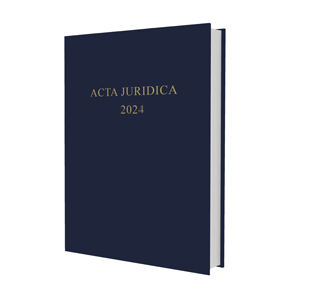
The impact of international labour standards on democratic governance and decent work in the era of global polycrisis: Selected Southern African perspectives
Authors Evance Kalula & William Mokofe
ISSN: 1996-2088
Affiliations: LLB (Zambia) LLM (London) PhD (Warwick); Professor Emeritus of Law, University of Cape Town; Independent Chairperson, ILO Committee on Freedom of Association; LLB (UFH) LLM LLD (South Africa); Advocate of the High Court of South Africa; independent researcher
Source: Acta Juridica, 2024, p. 117-148
https://doi.org/10.47348/ACTA/2024/a5
Abstract
This contribution is a tribute to Halton Cheadle’s work over the years, particularly his significant contribution to labour legislation and policy development and the enhancement of the role of international labour standards (ILS) in the SADC sub-region and elsewhere in Africa. Ever since the establishment of the International Labour Organisation (ILO) more than a hundred years ago, ILS has been a persuasive instrument in the search for universal democratic governance norms worldwide. Nowhere has that influence and impact been as visible as in developing countries. The impact of ILS in Southern Africa has been profound, not only in the struggle against racial discrimination, for instance in Zimbabwe and South Africa, but also in fostering labour rights through what was later designated as ‘decent work’. In more recent years, the promotion of ILS has been extended through the reform of labour legislation and policy. Cheadle has been deeply involved in the work of labour law reform, starting with South Africa in 1994, efforts that culminated in the current Labour Relations Act 66 of 1995, and then other African countries, such as Nigeria and Tanzania. His contribution continued when he served as a member of the ILO Committee of Experts on the Application of Conventions and Recommendations (CEACR). In an era that can be characterised as one of ‘global polycrisis’, the importance of ILS as a well-tested yardstick, renewed to address the challenges of a rapidly changing world of work, has become greater than ever before. This article will examine and analyse selected areas related to democratic governance developments.